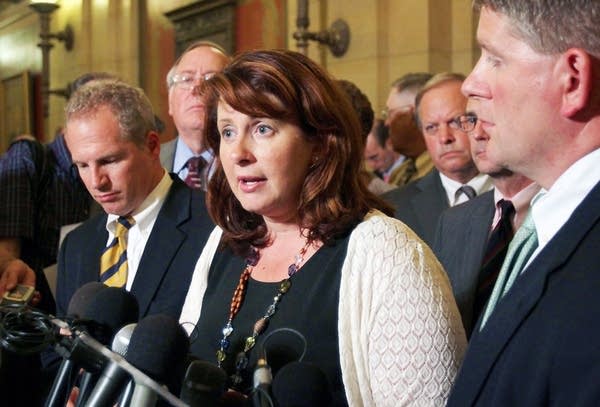Minn. politicians face the consequences of government shutdown

The failure of Gov. Mark Dayton and the Minnesota Legislature to reach a budget agreement is expected to result in broad political consequences.
After the wide-ranging state government shutdown, state legislators should expect to face angry constituents who will demand they return to work with the governor and finish the job, say former state lawmakers who dealt with similar budget stalemates.
The last time Minnesota had a government shutdown was in 2005. It was much smaller than this year's version, but former DFL Senate Majority Leader Dean Johnson said that time around people were angry, especially the voters he ran into back home during July 4th festivities.
Johnson, of Willmar, said he expects the same kind of encounters will take place this weekend all over the state.
Create a More Connected Minnesota
MPR News is your trusted resource for the news you need. With your support, MPR News brings accessible, courageous journalism and authentic conversation to everyone - free of paywalls and barriers. Your gift makes a difference.
"My advice to current legislators on both sides of the aisle, and the governor, is not to be out in public and wave the flag, but quietly go someplace where you will not be seen," he said.
Johnson said he went back to the Capitol after the holiday in 2005 and talked to then-Gov. Tim Pawlenty about a new proposal. It eventually led to a budget agreement and an end to the shutdown.
Johnson said similar flexibility is required now, and he suggested both sides soften their partisan positions on the budget.

"No one political party is 100 percent right, and no one political party is 100 percent wrong," Johnson said. "There's a difference between a partisan political position and governing. And the 61 new legislators -- and there's all new leadership and a new governor -- they haven't quite learned that yet."
Johnson said all incumbent legislators should be worried about the 2012 election, but he thinks Republicans, who control both houses of the Legislature, have the most to lose.
Former Republican House Speaker Steve Sviggum agrees. Sviggum, who was speaker in 2005, said the public rightly expects the governor and legislators to finish their work. He said there will be significant political consequences for incumbents.
"Governor Dayton has a four-year term, so he's three years out from election," said Sviggum, of Kenyon. "So political consequences for him will be kind of forgotten by the time it gets to his turn to be on the ballot again.
"For the 201 legislators, although it certainly will affect Democrats and Republicans alike, since the Republicans happen to be in the majority they probably have more at stake than the minority would at this time," he said.
"There's a difference between a partisan political position and governing. ... the new legislators, leadership and new governor ... haven't quite learned that yet."
Sviggum is reluctant to offer any suggestions on the budget, but he said he thinks there are other ways to increase revenue without raising taxes, and that the two sides should be able to find a solution.
Former Republican Rep. Dan Dorman said lawmakers will be under increasing pressure to strike a compromise on the budget. Dorman, of Albert Lea, said he thinks there are several Republicans who will be ready to cut a deal with the governor on some form of new revenue.
"I've talked to several of my former colleagues, and some of the newer ones that I didn't serve with but know. That group is there, but somebody is going to have to lead them," Dorman said. "The someone is either going to be somebody within in the Republican caucus stepping up saying, 'Look, I'm tired of this, we've got to get it done,' or it will be the leadership saying, 'we've got to get something done, and we want to steer the boat.'"
The government shutdown will be felt in different ways throughout the state. Former DFL Sen. Steve Kelley of Hopkins said he thinks the Republican legislators that have a lot of public employees and state services in their districts will be more willing to compromise.
"The shutdown could mean that some individual legislators will actually see the effects in their district," he said. "And as those effects build up, they will be focusing more on how do I solve this problem for my district, than sticking to the party line."
Kelley said he doesn't think there's any reason for the governor and Republican legislative leaders to rush back to the bargaining table until after the holiday weekend.
He suggests both sides take time on Independence Day to reflect on their shared civic legacy, and then get back to work next week.
